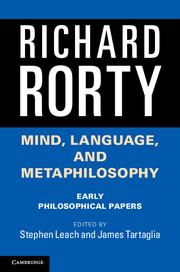Book contents
- Frontmatter
- Contents
- Foreword
- Acknowledgments
- Introduction
- 1 Pragmatism, categories, and language
- 2 The limits of reductionism
- 3 Realism, categories, and the “linguistic turn”
- 4 The subjectivist principle and the linguistic turn
- 5 Empiricism, extensionalism, and reductionism
- 6 Mind-body identity, privacy, and categories
- 7 Do analysts and metaphysicians disagree?
- 8 Incorrigibility as the mark of the mental
- 9 Wittgenstein, privileged access, and incommunicability
- 10 In defense of eliminative materialism
- 11 Cartesian epistemology and changes in ontology
- 12 Strawson’s objectivity argument
- 13 Verificationism and transcendental arguments
- 14 Indeterminacy of translation and of truth
- 15 Dennett on awareness
- 16 Functionalism, machines, and incorrigibility
- Index of names
- References
5 - Empiricism, extensionalism, and reductionism
Published online by Cambridge University Press: 05 June 2014
- Frontmatter
- Contents
- Foreword
- Acknowledgments
- Introduction
- 1 Pragmatism, categories, and language
- 2 The limits of reductionism
- 3 Realism, categories, and the “linguistic turn”
- 4 The subjectivist principle and the linguistic turn
- 5 Empiricism, extensionalism, and reductionism
- 6 Mind-body identity, privacy, and categories
- 7 Do analysts and metaphysicians disagree?
- 8 Incorrigibility as the mark of the mental
- 9 Wittgenstein, privileged access, and incommunicability
- 10 In defense of eliminative materialism
- 11 Cartesian epistemology and changes in ontology
- 12 Strawson’s objectivity argument
- 13 Verificationism and transcendental arguments
- 14 Indeterminacy of translation and of truth
- 15 Dennett on awareness
- 16 Functionalism, machines, and incorrigibility
- Index of names
- References
Summary
There was a time when the slogan “Let us construct an extensional language which is adequate to say everything!” stirred the hearts of empiricists. It seemed evident that all that was required to accomplish the project was energy and discrimination, for surely to deny that the job could be done would be somehow tantamount to doubting the cardinal tenets of empiricism. In the course of some twenty or thirty years, however, extensionalism has fallen into disrepute. On the one hand, there is a history of failure in the attempts actually to get the job done. On the other, there is the suggestion that empiricism was led astray by its delight in a new toy, and that the use of an extensional calculus has nothing in particular to do with the tradition of Locke and Hume. American philosophers have been told by their British colleagues that they have picked a quite arbitrary straight-jacket in which to confine language, and have thereby created for themselves a host of pseudo-problems about areas where the straight-jacket pinches. The artificiality of suggested extensionalistic reconstructions of these areas of discourse has made many philosophers receptive to suggestions that they can be bona fide empiricists without being “reductionists.”
The purpose of this chapter is to show that there are indeed internal relationships between empiricism and extensionalism, to explain what these relationships are, and to show that neither empiricism nor extensionalism is internally related to reductionism, in the sense in which this term is usually understood. In other words, I want to disentangle three theses which empiricists have tried to establish and discuss what the history of recent empiricism teaches us about the hopes for establishing them.
- Type
- Chapter
- Information
- Mind, Language, and MetaphilosophyEarly Philosophical Papers, pp. 96 - 105Publisher: Cambridge University PressPrint publication year: 2014
References
- 2
- Cited by



